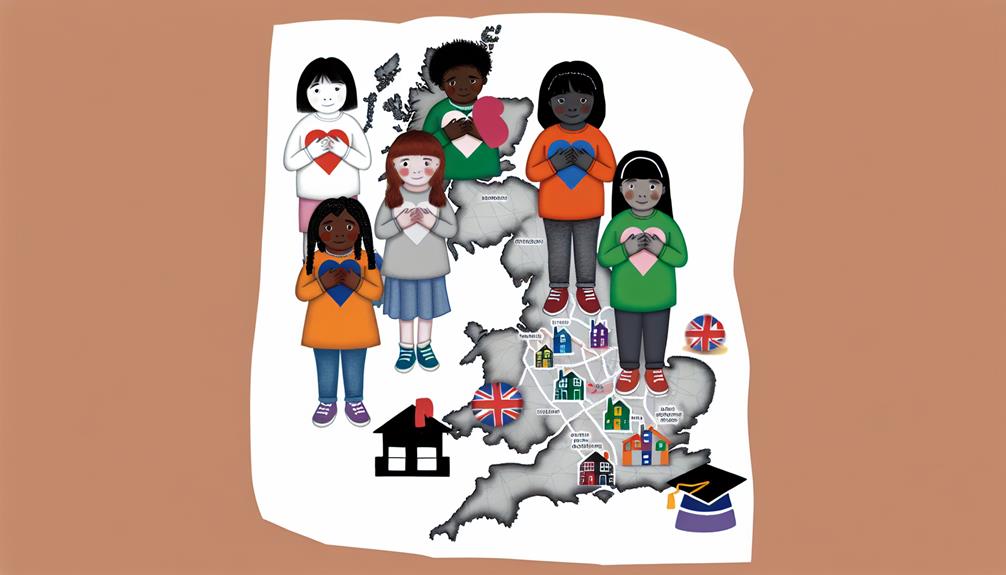Support services for foster care children are essential for their well-being. They cover physical health, providing nutritional guidance and exercise programs. Emotional support through counseling, peer groups, and trauma-focused therapy helps them deal with psychological trauma. Educationally, children receive tutoring, mentorship, and special assistance to thrive academically. It's also important for them to understand their legal rights, for which they receive specialized assistance. Aftercare services are also available, providing continuous emotional support and financial literacy training. As you journey further, you'll explore more about how these services empower foster children for a brighter future.
Key Takeaways
- Foster care children receive emotional support services like trauma counseling, peer groups, and evidence-based therapy.
- Physical health services include nutritional guidance, exercise programs, and fostering a positive attitude towards activity.
- Educational support encompasses tutoring, mentorship, extracurricular involvement, and special education services.
- Legal assistance includes court-appointed representation, legal rights education, and assistance in navigating the legal system.
- Therapeutic services like trauma-focused therapy, art expression therapy, and cognitive-behavioral therapy are available for personal growth and coping with trauma.
Understanding UK Foster Care

Exploring the world of UK foster care, you'll find a system dedicated to providing safe, nurturing environments for children who are unable to live with their biological families. However, maneuvering this system, including understanding the 'Foster Parenting Challenges' and 'Adoption Processes', can be both rewarding and complex.
As a potential foster parent, you're faced with a host of challenges, including securing suitable accommodation, undergoing rigorous checks, and receiving relevant training. You'll need to be resilient, as fostering can be emotionally demanding, dealing with children that have faced trauma or neglect. Yet, the rewards of providing a stable home for a child in need can be immeasurable.
The adoption process, while similar, has its distinctions. It's a lifelong commitment and once the adoption is finalized, you become the child's legal parent. This can bring its own set of complexities, including dealing with birth family issues and helping your child understand their identity.
Both paths demand patience, perseverance, and a deep well of love. With the right support and understanding, you'll not only navigate these processes but thrive in them, offering a lifeline to a child in need.
Emotional Support Services Available
Recognizing the emotional toll that fostering and adoption can take, there's a range of support services available to navigate these complexities, providing comfort and guidance on this journey. Among them, trauma counseling stands out as an essential component. This specialized therapy helps you and your foster child address the emotional and psychological impact of past experiences. Therapists use evidence-based practices to help kids process their feelings, learn coping strategies, and build resilience.
Peer groups are another invaluable resource. These groups bring together foster children and foster parents, creating a supportive community where you can share experiences, seek advice, and feel understood. They're a safe space where children can connect with others who've walked in their shoes, reducing feelings of isolation and promoting a sense of belonging.
Physical Health Services for Foster Children

Just as crucial as emotional support, physical health services play a key role in guaranteeing the wellbeing of foster children. Good nutrition is essential for a child's growth and development, and it's an area where foster care can often falter. This is where nutritional guidance comes in. You, as a foster parent, can gain access to professional advice to help make certain your child is receiving a balanced diet that supports their overall health.
You'll also find that exercise programs are another important part of physical health services. These programs are designed to help foster children develop healthy habits, improve their fitness, and boost their self-esteem. They offer diverse activities that cater to the child's age, interests, and ability level, promoting a positive attitude towards physical activity.
Educational Support in Foster Care
Mastering the educational system can be a challenge for foster care children, but you're not alone in this journey.
A variety of resources, including tutoring opportunities and special education services, are available to support and guide you.
Let's explore how these can enrich your foster child's learning experience and aid them in reaching their full academic potential.
Tutoring Opportunities
Amidst the challenges you might face in the foster care system, tutoring opportunities can provide invaluable academic support and guidance, paving the way for educational success.
These programs often include mentorship initiatives, where seasoned tutors model study habits, promote commitment, and instill a love for learning. By pairing you with a tutor, you're not just getting academic aid, but also a mentor who understands your unique needs.
Further, extracurricular involvement is encouraged. Activities like debate, chess, or coding clubs can supplement your learning. These platforms provide a chance to apply the knowledge you've gained, boosting your confidence.
Special Education Services
In addition to tutoring, special education services play an essential role in supporting your academic journey within the foster care system, providing tailored assistance to meet your specific learning needs. These services incorporate three key elements:
- Individualized Education Programs (IEPs) that outline your unique learning objectives and strategies.
- Inclusion strategies that guarantee your participation in general education settings while receiving the support you need.
- Advocacy for your Disability Rights, guaranteeing your equal access to education.
These services don't just help you keep pace with your peers; they empower you to thrive. Recognize that your potential isn't defined by your circumstances. Special education services are there to provide the scaffolding you need to climb towards academic success.
Legal Assistance for Foster Children

When it comes to the complex legal system, foster children often need specialized assistance to effectively advocate for their rights and needs. This is where court-appointed representation and legal rights education come into play. A court-appointed representative acts as the child's voice in legal proceedings, ensuring that their most important interests are always considered. They're trained to navigate the legal maze with precision, providing necessary support and guidance.
Legal rights education is another vital aspect. It's not enough for you to have rights; you must also understand them. Foster children are taught their rights, as well as how to assert them, providing them with the tools they need to advocate for themselves. This education empowers them, fostering a sense of self-worth and confidence.
Social Services for UK Foster Kids
Exploring the maze of social services available for UK foster kids can be essential, but it's important to comprehend these resources to fully support their personal growth and wellbeing. Let's investigate three key services that are fundamental for these children's development:
- Financial Aid: This service is instrumental in offering monetary support to foster families. It's tailored to help cover the costs of raising a child, from daily necessities to educational expenses. Understanding how to navigate this aid can greatly lighten the financial burden on foster families.
- Housing Assistance: In the UK, specific programs are designed to provide stable and secure housing for foster children. These initiatives aim to guarantee that every child has a comfortable place to call home.
- Educational Support: Foster kids often need additional educational resources to thrive academically. These may include tutoring, special educational needs support, and school fee assistance.
It's not just about identifying these services, but also understanding how to access and maximize them. As a foster parent or caregiver, you're not alone in this journey. The UK social services are there to help, providing a safety net for you and your foster child. With careful navigation, you'll find an array of support designed to facilitate a nurturing environment.
Therapeutic Services Within Foster Care

As you navigate through the complexities of foster care, it's important to understand the role of therapeutic services in this journey.
These services, which range in type, offer invaluable benefits that can aid in a child's development and healing.
Let's unpack how therapeutic services function within the foster care system and why they're an essential component of support for these children.
Foster Care Therapy Types
Exploring the world of foster care, you'll find a range of therapy types specifically designed to help children cope with their unique experiences and challenges. A key type is trauma-focused therapy, aimed at aiding a child to process and understand the traumatic events they've experienced.
- Trauma-focused therapy: This method targets the emotional responses to traumatic events, allowing the child to address them in a safe environment.
- Artistic expression therapy: This type uses art to help children communicate their feelings, thoughts, and experiences, often when words fail.
- Cognitive-behavioral therapy: This approach helps children challenge and change destructive or harmful thought patterns that may affect their behavior and overall well-being.
Understanding these therapies will empower you to make informed decisions for the welfare of foster care children.
Benefits of Therapeutic Services
In the domain of foster care, therapeutic services provide numerous advantages that can greatly improve a child's ability to cope with past trauma, express their feelings, and develop healthier thought patterns. You'll find therapy effectiveness is paramount in these settings, as it fosters resilience and aids in overcoming emotional hurdles.
One notable form of therapy is art therapy, a creative outlet that offers a non-threatening platform for children to communicate their feelings. Art therapy can be instrumental in helping foster children convey emotions they may find difficult to verbalize. It's a powerful tool that promotes healing, self-discovery, and personal growth.
Importance of Aftercare Support Services
Understanding the essential role of aftercare support services can truly transform a foster child's journey towards independence, and it's a topic we mustn't overlook. These support services, such as mentoring programs and financial literacy training, are critical in ensuring a successful shift into adulthood.
- Mentoring programs provide foster children with role models who can guide them through life's challenges. These mentors offer invaluable advice, emotional support, and positive influence, which often result in improved self-esteem and better decision-making skills.
- Financial literacy is another crucial aspect of aftercare support. By teaching foster children about budgeting, saving, and investing, we're giving them the tools to manage their finances wisely, preventing potential economic hardships in the future.
- Finally, these services also offer continuous emotional and psychological support, helping foster children cope with potential traumas and insecurities that could interfere with their progress.
Frequently Asked Questions
What Are the Main Challenges Faced by Foster Care Children in Adapting to a New Family Environment?
You'll often find foster children grappling with attachment issues; they struggle to trust and bond with new families. They also must develop emotional resilience to cope with their past traumas and the constant changes.
How Does the Process of Transitioning From Foster Care to Independent Living Work in the Uk?
In the UK, moving from foster care to independent living is like a planned journey. You're provided with post care education and support, based on foster care statistics, to help you navigate life independently.
What Kind of Financial Support Is Available for Foster Care Children in the Uk?
In the UK, you'll find financial aid like Education Assistance for school-related costs. Additionally, Adoption Incentives provide monetary support when you adopt from foster care. It's about easing your change and promoting success.
How Do Cultural and Language Barriers Impact the Support Services Provided to Foster Children?
Cultural and language barriers can hinder effective communication. You'd benefit from cultural sensitivity training and language learning resources to better understand and meet the unique needs of your foster child.
Are There Any Specific Support Services Available for Foster Children With Special Needs or Disabilities?
Yes, there are. Like a lifeline in stormy seas, Special Education Resources and Disability Advocacy are available to navigate the challenges for foster children with special needs or disabilities, offering necessary support and guidance.
Conclusion
Exploring the UK foster care system can be intricate, but always remember, 'it takes a community to raise a child'. Embrace the variety of support services available, from emotional and physical health services to educational, legal, and social aid.
Therapeutic services and aftercare are equally essential. Each piece plays an important role in ensuring the wellbeing of foster children. It's about more than just survival; it's about helping these children thrive.




